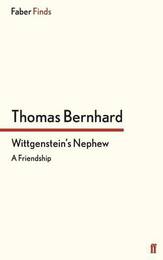
|
Wittgenstein's Nephew: A Friendship
Paperback
Main Details
| Title |
Wittgenstein's Nephew: A Friendship
|
| Authors and Contributors |
By (author) Thomas Bernhard
|
| Physical Properties |
| Format:Paperback | | Pages:106 | | Dimensions(mm): Height 198,Width 126 |
|
| Category/Genre | Modern and contemporary fiction (post c 1945) |
|---|
| ISBN/Barcode |
9780571288410
|
| Classifications | Dewey:833.914 |
|---|
| Audience | |
|---|
| Edition |
Main
|
|
Publishing Details |
| Publisher |
Faber & Faber
|
| Imprint |
Faber & Faber
|
| Publication Date |
17 January 2013 |
| Publication Country |
United Kingdom
|
Description
Thomas Bernhard (1931-1989) has been hailed by Gabriel Josipovici as 'Austria's finest postwar writer' and by George Steiner as 'one of the masters of contemporary European fiction.' Faber Finds is proud to reissue a selection of four of Bernhard's finest novels. Wittgenstein's Nephew (1982) opens in 1967 as two men lie bedridden in separate wings of a Viennese hospital. The narrator, Thomas Bernhard, is stricken with a lung ailment; his friend Paul, nephew of Ludwig Wittgenstein, is suffering from one of his periodic bouts of madness. As their once-casual friendship quickens, these eccentric men begin to see in each other a possible antidote to their feelings of hopelessness and mortality, on the unexpected strength of what they hold in common. 'Furious, obsessive, scathing, absolutely hilarious and oddly beautiful.' Claire Messud, Salon 'A memento mori that approaches genius.' Richard Locke, Wall Street Journal
Author Biography
Thomas Bernhard (1931-1989) has been hailed by Gabriel Josipovici as 'Austria's finest postwar writer' and by George Steiner as 'one of the masters of contemporary European fiction.' Faber Finds is proud to reissue a selection of four of Bernhard's finest novels: Concrete, The Loser, Extinction and Wittgenstein's Nephew.
Reviews"Furious, obsessive, scathing, absolutely hilarious and oddly beautiful."--Claire Messud, author of "The Emperor's Children", on "Salon""Bernhard's fiction is full of energy; his restless imagination cannot leave a fact or idea alone. . . . Only someone with such a brilliant, tricky, inexhaustible mind could get away with "Wittgenstein's Nephew"."--"The New York Times""In its obsessive, elegant rhythms and narrative eloquence, ["Wittgenstein's Nephew"] resembles a tragic aria by Richard Strauss. . . . A memento mori that approaches genius." --"Wall Street Journal""Oddly moving and funny. . . . A meditative fugue for mad, brilliant voices on the themes of death, death-in-life and the artist's and thinker's role in society."--"Chicago Tribune""Bernhard is a writer of great originality and fascination."--"The New York Review of Books""In the annals of literature, Thomas Bernhard will stand as Austria's postwar genius."--"The Washington Times""Thomas Bernhard is one of the masters of contemporary European fiction. . . . After Kafka and Canetti's, his sensibility is one of the most acute, the most capable of exemplary images and gestures, in modern literature."--George Steiner"It is high time that we keep Bernhard firmly in our mind, as European readers have been doing for many years now."--"Christian Science Monitor"
|